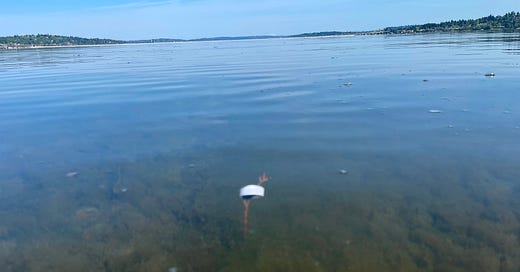Plastic Plastic Everywhere
A corporate trash pickup event for Earth Week got me thinking about plastic, the limits of our economic system, and what really matters.
Earlier this morning I walked down to the lake to collect trash as part of my company’s global trash pickup event for Earth Week. From the road, Lake Washington looks pristine, yet the closer you get to the shore, and the closer your nose gets to the ground, the more trash you see. Styrofoam pieces you can get with two fingers, mostly white but some blue or green, with a few larger pieces mixed in that require an entire hand to collect. Marijuana vials and alcohol containers galore. Shards of glass. A can of Red Bull. Pieces of yarn and the occasional unidentified and very wet item.
But mostly what I found was plastic. From tiny to hand-sized, from thin films that protect single-use food items to hard plastics used in beach toys for kids, from clear to black and almost every color in between, I couldn’t walk more than two steps on the shoreline without stopping to pick up some plastic. I even took my shoes off and waded into the lake on several occasions to fish out pieces of plastic before they sunk to the bottom or were eaten.
Beyond plastic, the other thing that you see every few feet is goose poop. As I finished up and turned to go home, I saw a family of those pooping machines, two parents and twelve yellow, fuzzy goslings, digging at the grass in search of food just a few steps from where I’d been collecting trash.
I just knew that plastic was mixed in with the grass they were eating. My mind turned to the horrifying picture of the albatross on Midway Island that starved to death with a stomach full of plastic that looked exactly like the trash in my bag. I hoped that these geese wouldn’t meet the same fate.
But even if they didn’t, plastic was part of their diet, and they’d eventually spread it all over the region and beyond with their shit. The tiny organisms that eat that shit will eventually be eaten by others, and thus the plastic will head back up through the food web, with ever increasing levels of toxicity.
Plastics are one place where modern economics breaks down. It’s cheap, but only when we think about cost in a very narrow, monetary sense. We aren’t including how ruinous plastic in the environment is because we don’t know how to measure its impact on ecosystems, which are too complex and varied for our simplistic models. Instead of taking the humble view that some things that can’t be precisely valued monetarily are still valuable—perhaps more valuable than what we can measure—we simply call plastic in the environment an externality and move on. (Externality is an interesting choice of words, as this suggests that what is real is our economic system, not the actual planet on which we live and depend.) In some jurisdictions, governments impose an extended producer responsibility tax on plastics, but even then, they’re not taking the full cost to ourselves or the ecosystem into consideration.
What we need isn’t a better system for calculating impacts (which can be endlessly debated and watered-down), but a clearer sense of what has value. When future archaeologists look back on our era, we’re liable to be known as the era of plastic, defined by supposedly cheap commodities that enabled an unsustainable lifestyle while contributing to our demise.
Thankfully, there is another path, a better path. Just last night, I was feeling down, so I headed out to my backyard to look at the native plants I’d planted and ignored since Trump’s victory in November. To my delight, many of them are thriving.
So instead of the plastic era, maybe we can be known as the era of revitalization, the era of rewilding. If a non-gardener like me can rewild a patch of the earth based on post-election pique, imagine what we could do working together?





Thank you for this J.R. You have such a gift for soberly laying out big problems, yet tying it together with hope. Love your back yard nature!
Thank you for this important posting. If only—if only plastic weren’t the packaging of choice for so many products. If only we had responsible leaders and manufacturers. If only . . .